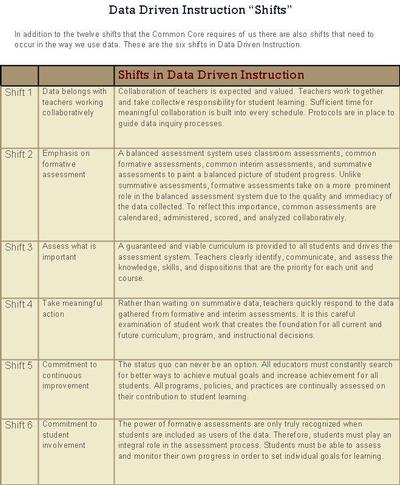 Data Driven Instruction (DDI)
Data Driven Instruction (DDI)
A fundamental shift in the type of data we emphasize and the way in which we use it has to occur if we want data to make a difference in the classroom. For the past fifteen years we have focused on an analysis of summative, state exams with little to show for it. Rarely did classroom instruction ever change as a result of all the time spent examining state tests results because those tests were designed for accountability and placement and not for instructional decision-making.
Instead, we have to us common, formative assessments (classroom-based as well as interim assessments). The research is clear, formative assessmenst can make a difference on classroom practice and can make a difference in student achievement. In fact, it can make a bigger difference in student learning than just about anything else we can do in our classrooms.
Here are some of the resources the OCM BOCES Network Team is using with our schools to make the data-driven instruction shift:
- Six Shifts of DDI
- Balanced Assessment System
- Balanced Assessment System (CNY NYS ASCD presentation slides and sort cards)
- Why Should We Use Formative Assessments? Reproducible from Solution Tree, Learning by Doing
- Why Should We Use Common Assessments? Reproducible from Solution Tree, Learning by Doing
- Common Formative/Interim Assessment Map templates and explanation
- Common Assessment Workshop slides
- Assessment Crisis: The Absence of Assessment For Learning (article by Rick Stiggins)
- Moving Toward a Comprehensive Assessment System: A Framework for Considering Interim Assessments (article by Perie, Marion, & Gong)
Protocols for Looking at Student Work
- Learning from Student Work (30 minute protocol)
- Looking at Data from Student Work (60 minutes
- Teachning Matters (protocol collection)
Inquiry Teams
- Inquiry Team Handbook (from NYC and frequently referenced)
- Lessons Learned from the NYC Inquiry Process
1633
Assessment
Balanced Assessment System and RTTT (from CNY NYS ASCD presentation)
Latest Overview of PARCC (Partnership for the Assessment of Readiness for College and Career)
PARCC assessment scheme at a glance or in a presentation
Watch the videos from the latest PARCC meeting (June 2011) to learn more about CCSS and PARCC
Coming Together to Raise Achievement: New Assessments for the Common Core State Standards (report from ETS)
Assessment 2.0: "Next-Generation" Comprehensive Assessment Systems (Aspen Center analysis of the two assessment consortia)
Reproducibles from Marzano's Formative Assessment & Standards-Based Grading book
Assessing What Matters - This article by Robert J. Sternberg was published in Educational Leadership in December 2007. It is an excellent overview of what traditional measures can miss when it comes to 21st century outcomes for students.
Assessment: A 21st Century Skills Implementation Guide - This guide articulates some key steps educational leaders would consider when implementing assessment of 21st century skills.
Be Clear About the Heavy Lifting Ahead for New Assessments Bill Tucker Blog: "If we really want to make asessment better - and our accountability systems, use of data, effectiveness evaluations, etc. all hang on assessment - then it's going to take much more than this one federal grant."
EdSector Policy Papers on Assessment in the 21st Century
- Beyond the Bubble: Technology and the Future of Student Assessment - Bill Tucker - In a new Education Sector report, Managing Director Bill Tucker argues that technology has the potential to drastically improve our current assessment systems and practices, leading to significiant improvements in teaching and learning in the nation's classrooms.
- Measuring Skills for the 21st Century - Elena Silva - Leaders in government, business, and higher education are calling for today's students to show a mastery of broader and more sophisticated skills like evaluationg and analyzing information and thinking creatively about how to solve real-world problems. But standing in the way of incorporating such skills into teaching and learning are widespread concerns about measurements. In this report, Senior Policy Analyst Elena Silva examines new models of assessment that illustrate that the skills that really matter for the 21st century can be measured accurately and in a common and comparable way.
Exploring the Intersection of Science Education and 21st Century Skills: A Workshop Summary, Margaret Hilton - addresses key questions about the overlap between 21st century skills and scientific content and knowledge; explores promising models or approaches for teaching these abilities; and reviews the evidence about the transferability of these skills to real workplace applications. Download PDF book free Read book free online
Pearson - Thoughts on an Assessment of Common Core Standards


 Careers
Careers Staff Only
Staff Only Personnel
Personnel Sub Call-In Service
Sub Call-In Service Health & Safety
Health & Safety
